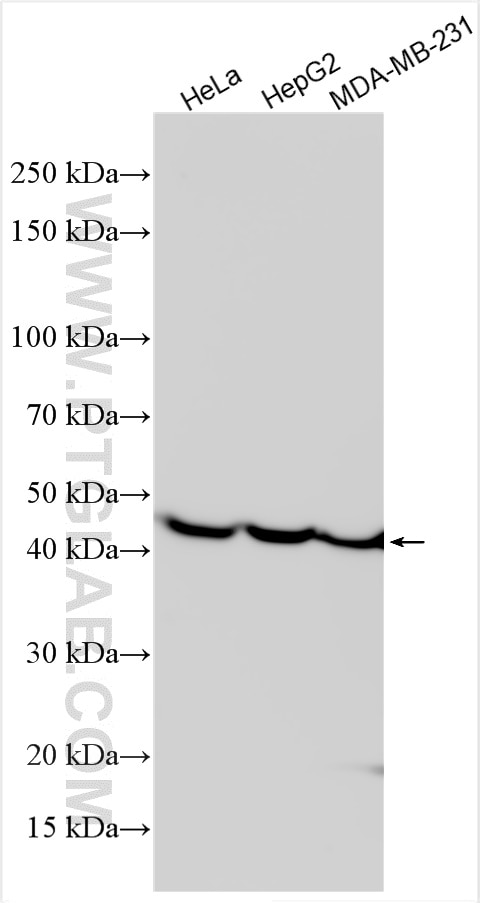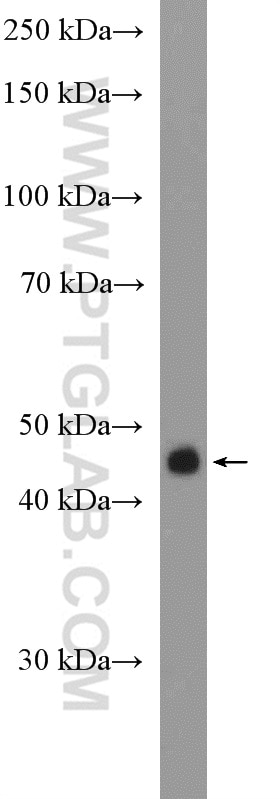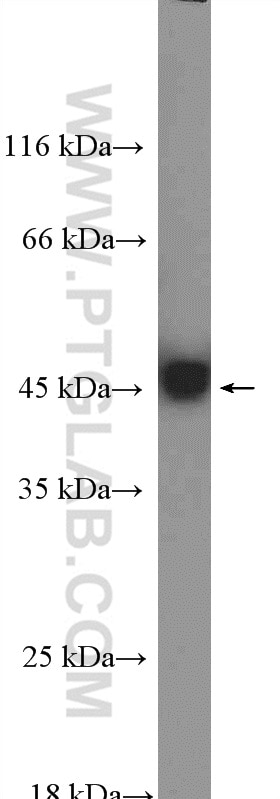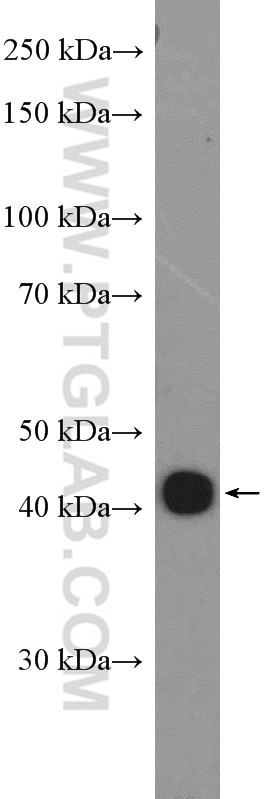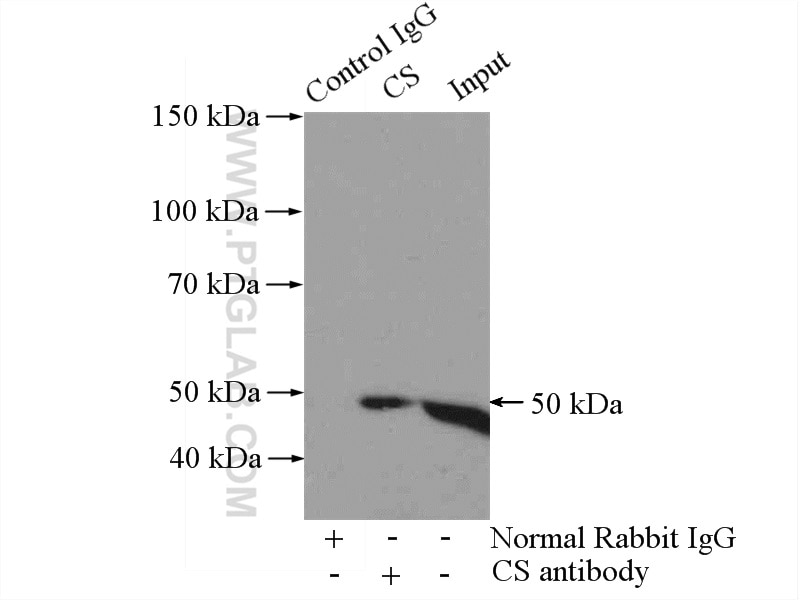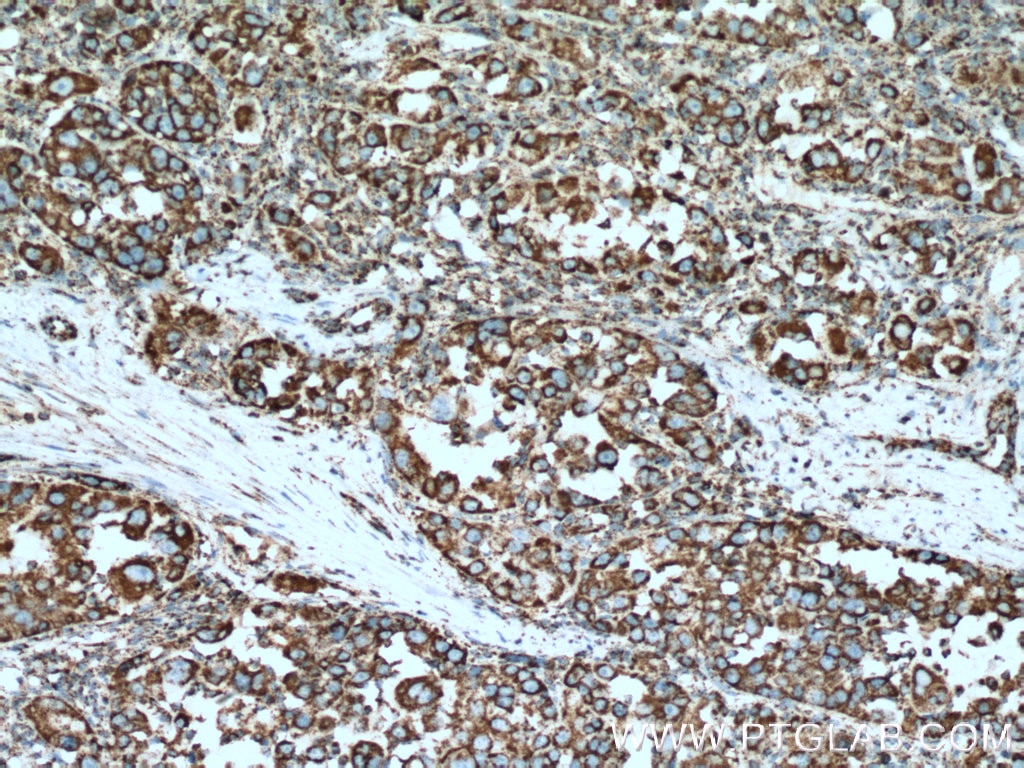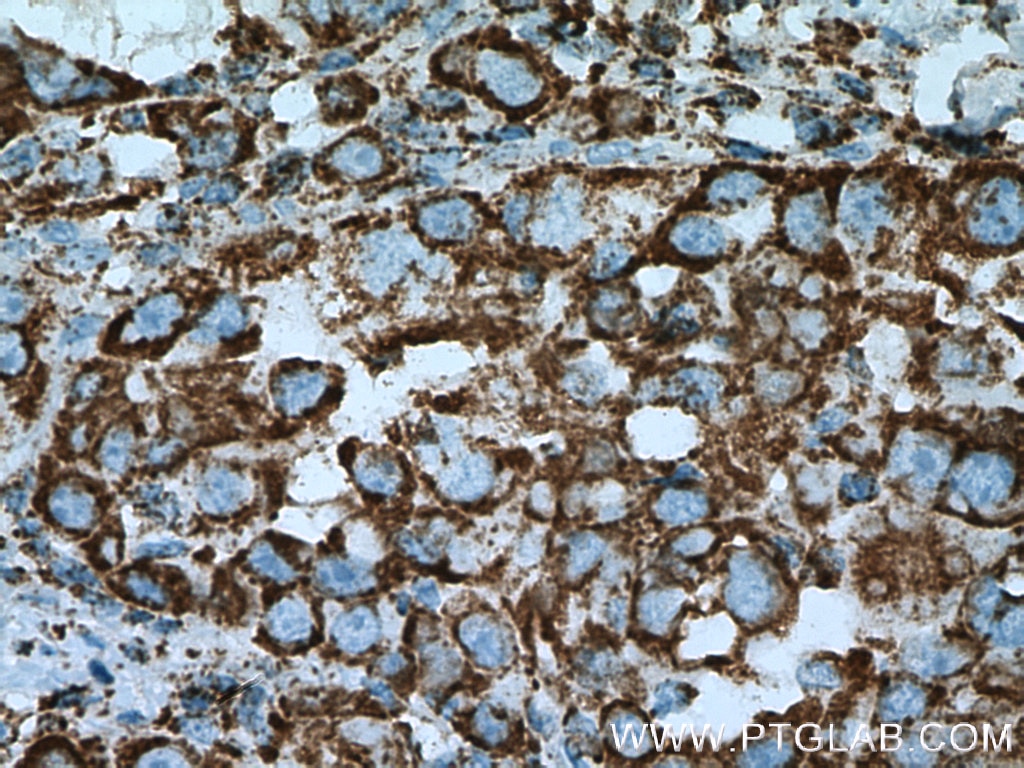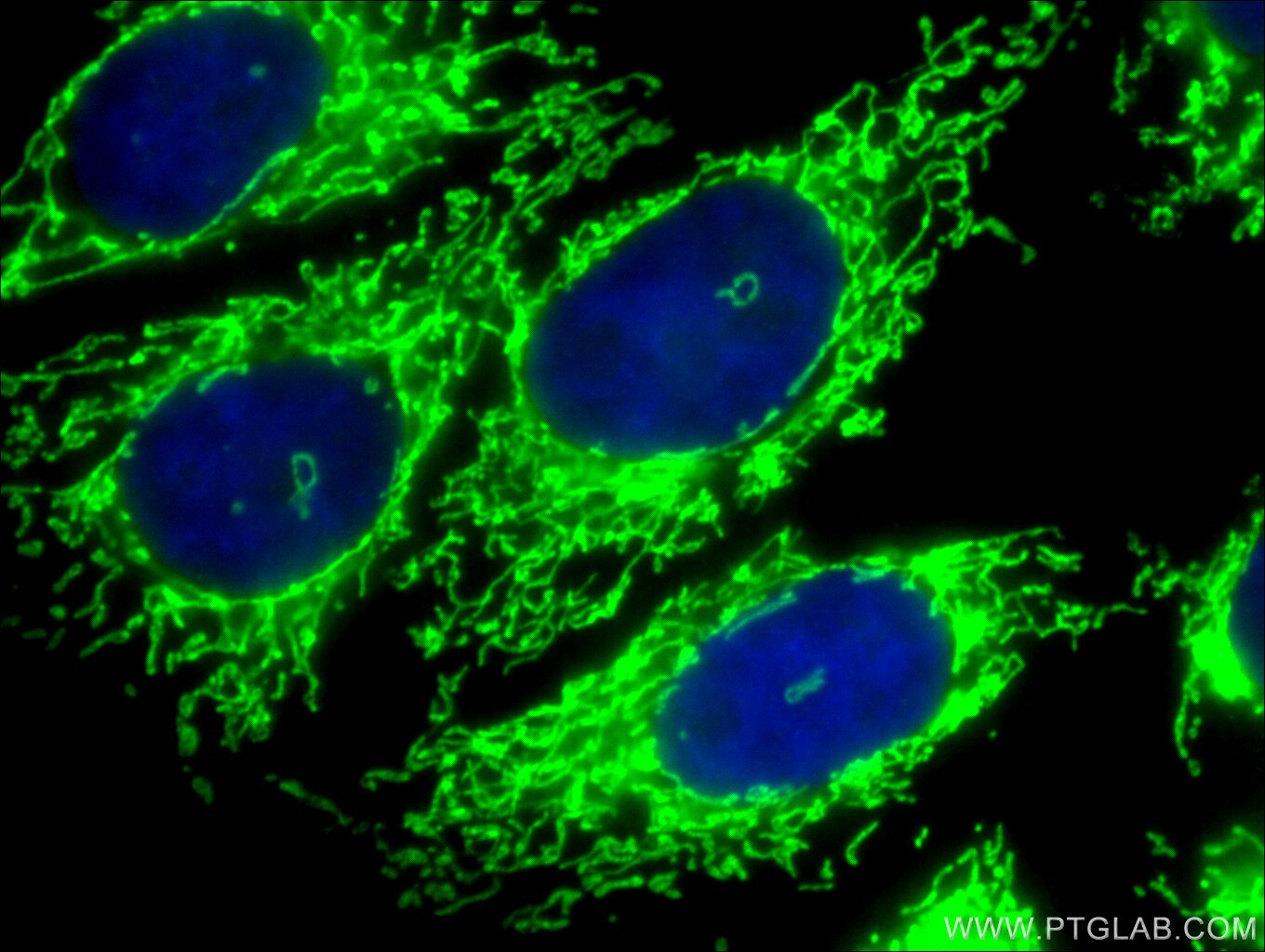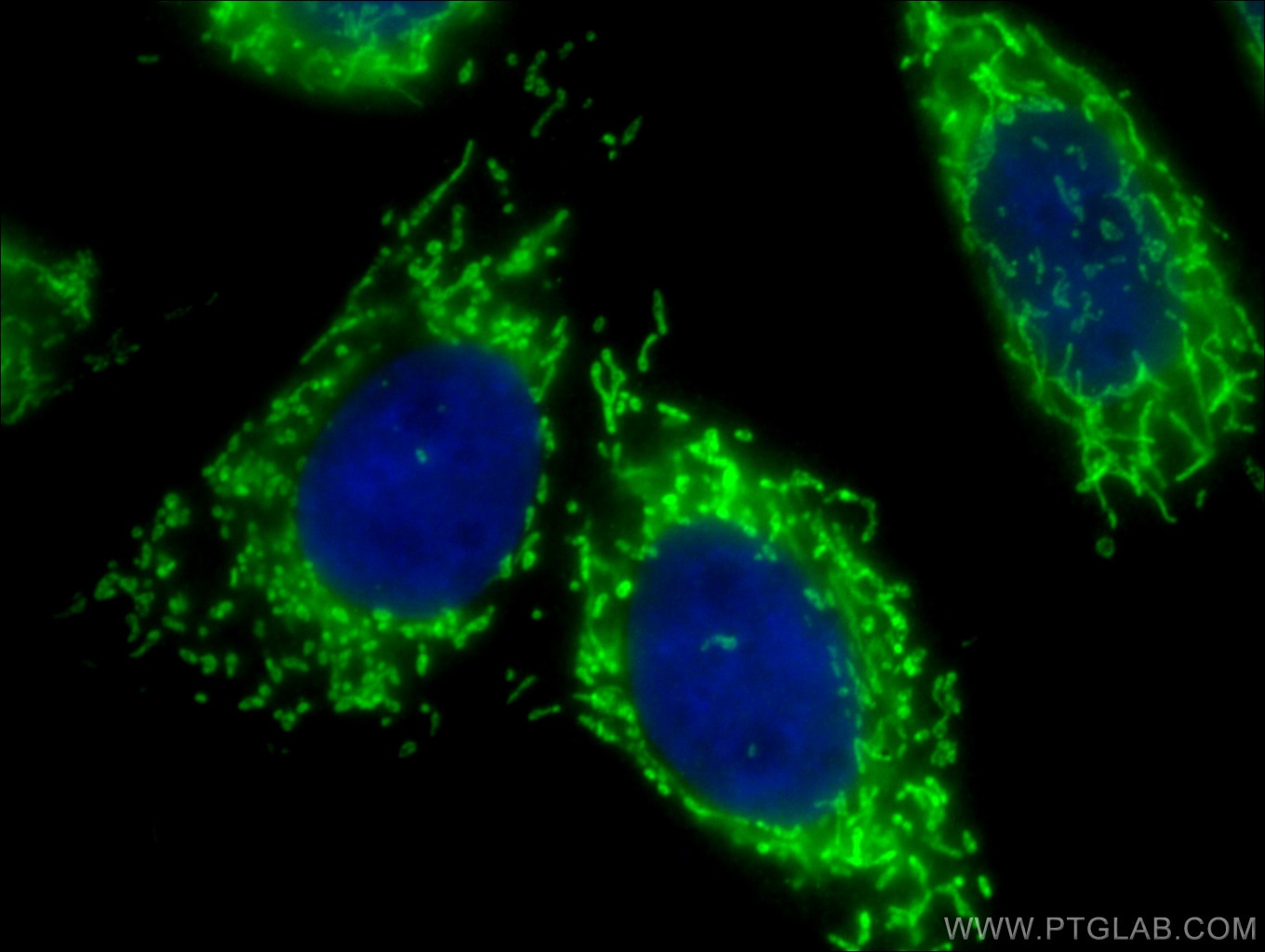- Phare
- Validé par KD/KO
Anticorps Polyclonal de lapin anti-Citrate synthase
Citrate synthase Polyclonal Antibody for WB, IP, IHC, ELISA, IF/ICC
Hôte / Isotype
Lapin / IgG
Réactivité testée
Humain, rat, souris et plus (3)
Applications
WB, IP, IHC, CoIP, ELISA, IF/ICC
Conjugaison
Non conjugué
N° de cat : 16131-1-AP
Synonymes
Galerie de données de validation
Applications testées
| Résultats positifs en WB | tissu cardiaque de souris, cellules HeLa |
| Résultats positifs en IP | tissu cardiaque de souris |
| Résultats positifs en IHC | tissu de cancer du foie humain, il est suggéré de démasquer l'antigène avec un tampon de TE buffer pH 9.0; (*) À défaut, 'le démasquage de l'antigène peut être 'effectué avec un tampon citrate pH 6,0. |
| Résultats positifs en IF/ICC | cellules HepG2, |
Dilution recommandée
| Application | Dilution |
|---|---|
| Western Blot (WB) | WB : 1:1000-1:8000 |
| Immunoprécipitation (IP) | IP : 0.5-4.0 ug for 1.0-3.0 mg of total protein lysate |
| Immunohistochimie (IHC) | IHC : 1:100-1:400 |
| Immunofluorescence (IF)/ICC | IF/ICC : 1:50-1:500 |
| It is recommended that this reagent should be titrated in each testing system to obtain optimal results. | |
| Sample-dependent, check data in validation data gallery | |
Applications publiées
| KD/KO | See 1 publications below |
| WB | See 68 publications below |
| IHC | See 3 publications below |
| IF | See 10 publications below |
| IP | See 3 publications below |
| CoIP | See 1 publications below |
Informations sur le produit
16131-1-AP cible Citrate synthase dans les applications de WB, IP, IHC, CoIP, ELISA, IF/ICC et montre une réactivité avec des échantillons Humain, rat, souris
| Réactivité | Humain, rat, souris |
| Réactivité citée | rat, Humain, Lapin, poulet, souris, Hamster |
| Hôte / Isotype | Lapin / IgG |
| Clonalité | Polyclonal |
| Type | Anticorps |
| Immunogène | Citrate synthase Protéine recombinante Ag9117 |
| Nom complet | citrate synthase |
| Masse moléculaire calculée | 466 aa, 52 kDa |
| Poids moléculaire observé | 45-50 kDa |
| Numéro d’acquisition GenBank | BC010106 |
| Symbole du gène | Citrate Synthase |
| Identification du gène (NCBI) | 1431 |
| Conjugaison | Non conjugué |
| Forme | Liquide |
| Méthode de purification | Purification par affinité contre l'antigène |
| Tampon de stockage | PBS avec azoture de sodium à 0,02 % et glycérol à 50 % pH 7,3 |
| Conditions de stockage | Stocker à -20°C. Stable pendant un an après l'expédition. L'aliquotage n'est pas nécessaire pour le stockage à -20oC Les 20ul contiennent 0,1% de BSA. |
Informations générales
Citrate synthase (CS), the first and rate-limiting enzyme of the tricarboxylic acid cycle, plays a key role in regulating energy generation of mitochondrial respiration(PMID:19479947).It belongs to the citrate synthase family. The deduced 466-amino acid protein contains an N-terminal mitochondrial targeting sequence and a motif highly conserved in citrate synthases(PMID:12549038). It can exsit as a dimer(PMID:8749851). Northern blot analysis detected no CS expression in thymus and small intestine(PMID:12549038). This antibody is specific to CS.
Protocole
| Product Specific Protocols | |
|---|---|
| WB protocol for Citrate synthase antibody 16131-1-AP | Download protocol |
| IHC protocol for Citrate synthase antibody 16131-1-AP | Download protocol |
| IF protocol for Citrate synthase antibody 16131-1-AP | Download protocol |
| IP protocol for Citrate synthase antibody 16131-1-AP | Download protocol |
| Standard Protocols | |
|---|---|
| Click here to view our Standard Protocols |
Publications
| Species | Application | Title |
|---|---|---|
Adv Mater Supramolecular Hydrogel with Ultra-Rapid Cell-Mediated Network Adaptation for Enhancing Cellular Metabolic Energetics and Tissue Regeneration | ||
Nat Cell Biol Breast-cancer-secreted miR-122 reprograms glucose metabolism in premetastatic niche to promote metastasis. | ||
ACS Cent Sci A Selective SARS-CoV-2 Host-Directed Antiviral Targeting Stress Response to Reactive Oxygen Species | ||
Mol Cell Filamentous GLS1 promotes ROS-induced apoptosis upon glutamine deprivation via insufficient asparagine synthesis. | ||
Nat Commun Lin28/let-7 axis regulates aerobic glycolysis and cancer progression via PDK1. |
Avis
The reviews below have been submitted by verified Proteintech customers who received an incentive forproviding their feedback.
FH RAHUL (Verified Customer) (07-03-2019) | Works very good with human cell lysates. 1:1000 dilution in 5% milk; 1 hr incubation at RT.
|
